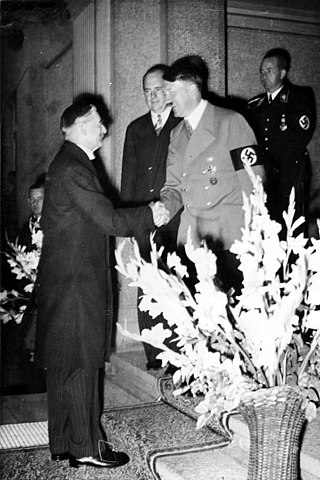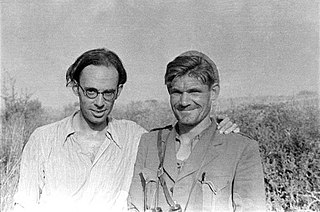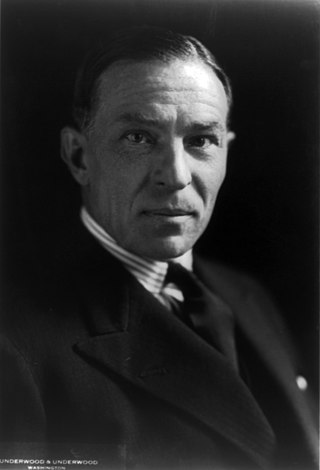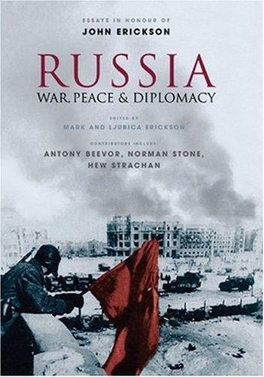Related Research Articles

The film industry in Germany can be traced back to the late 19th century. German cinema made major technical and artistic contributions to early film, broadcasting and television technology. Babelsberg became a household synonym for the early 20th century film industry in Europe, similar to Hollywood later. Early German and German-speaking filmmakers and actors heavily contributed to early Hollywood.

The Cliveden set were an upper-class group of politically influential people active in the 1930s in the United Kingdom, prior to the Second World War. They were in the circle of Nancy Astor, Viscountess Astor, the first female Member of Parliament to take up her seat. The name comes from Cliveden, a stately home in Buckinghamshire that was Astor's country residence.

Appeasement, in an international context, is a diplomatic negotiation policy of making political, material, or territorial concessions to an aggressive power with intention to avoid conflict. The term is most often applied to the foreign policy between 1935 and 1939 of the British governments of Prime Ministers Ramsay MacDonald, Stanley Baldwin and most notably Neville Chamberlain towards Nazi Germany and Fascist Italy. Under British pressure, appeasement of Nazism and Fascism also played a role in French foreign policy of the period but was always much less popular there than in the United Kingdom.

Francis Claud Cockburn was a British journalist. His saying "believe nothing until it has been officially denied" is widely quoted in journalistic studies, but he did not claim credit for originating it. He was the second cousin, once removed, of the novelists Alec Waugh and Evelyn Waugh. He lived at Brook Lodge, Youghal, County Cork, Ireland.

Patrick Leopold Gordon of Auchleuchries was a general and rear admiral in Russia, of Scottish origin. He was descended from a family of Aberdeenshire, holders of the estate of Auchleuchries, near Ellon. The family was connected with the noble branch of Haddo. As a result of his distinguished service for Sweden, Poland and Russia he rose in ranks from trooper to full general, and became a principal advisor and close friend of Tsar Peter the Great. Gordon assumed the additional Christian name of Leopold when confirmed as a Roman Catholic shortly before his death.

Sir Harold George Nicolson was a British politician, diplomat, historian, biographer, diarist, novelist, lecturer, journalist, broadcaster, and gardener. His wife was the writer Vita Sackville-West.
Rupert William Simon Allason is a British former Conservative Party politician and author. He was the Member of Parliament (MP) for Torbay in Devon, from 1987 to 1997. He writes books and articles on the subject of espionage under the pen name Nigel West.

Robert Gilbert Vansittart, 1st Baron Vansittart,, known as Sir Robert Vansittart between 1929 and 1941, was a senior British diplomat in the period before and during the Second World War. He was Principal Private Secretary to the Prime Minister from 1928 to 1930 and Permanent Under-Secretary at the Foreign Office from 1930 to 1938 and later served as Chief Diplomatic Adviser to the British Government. He is best remembered for his opposition to appeasement and his strong stance against Germany both during and after the Second World War. Vansittart was also a published poet, novelist and playwright.
Peter Maurice Wright CBE was a principal scientific officer for MI5, the British counter-intelligence agency. His book Spycatcher, written with Paul Greengrass, became an international bestseller with sales of over two million copies. Spycatcher was part memoir, part exposé detailing what Wright claimed were serious institutional failures he investigated within MI5. Wright is said to have been influenced in his counterespionage activity by James Jesus Angleton, counter-intelligence chief of the US Central Intelligence Agency (CIA) from 1954 to 1975.
Walter Ze'ev Laqueur was a German-born American historian, journalist and political commentator. He was an influential scholar on the subjects of terrorism and political violence.
The Hoare–Laval Pact was an initially secret pact made in December of 1935 between French Foreign Minister Pierre Laval and British Foreign Secretary Sir Samuel Hoare for ending the Second Italo-Ethiopian War. Italy wanted to incorporate the independent nation of Abyssinia (Ethiopia) into its Italian Empire and also avenge the 1896 Battle of Adwa, a humiliating defeat. The pact proposed to partition Abyssinia and thus partially achieve Italian dictator Benito Mussolini's goal of making Abyssinia an Italian colony.
John Erickson, FRSE, FBA, FRSA was a British historian and defence expert who wrote extensively on the Second World War. His two best-known books – The Road to Stalingrad and The Road to Berlin – dealt with the Soviet response to the German invasion of the Soviet Union, covering the period from 1941 to 1945. He was respected for his knowledge of the Soviet Union during the Cold War. His Russian language skills and knowledge gained him respect.

William Strang, 1st Baron Strang was a British diplomat who served as a leading adviser to the British Government from the 1930s to the 1950s and as Permanent Under-Secretary at the Foreign Office from 1949 to 1953.

The remilitarisation of the Rhineland began on 7 March 1936, when military forces of the German Reich entered the Rhineland, which directly contravened the Treaty of Versailles and the Locarno Treaties. Neither France nor Britain was prepared for a military response, so they did not act. After 1939, commentators often said that a strong military move in 1936 might have ruined the expansionist plans of Adolf Hitler, the dictator of Germany. However, recent historiography agrees that both public and elite opinion in Britain and France strongly opposed a military intervention, and neither had an army prepared to move in.

The Trawniki concentration camp was set up by Nazi Germany in the village of Trawniki about 40 kilometres (25 mi) southeast of Lublin during the occupation of Poland in World War II. Throughout its existence the camp served a dual function. It was organized on the grounds of the former Polish sugar refinery of the Central Industrial Region, and subdivided into at least three distinct zones.

The European foreign policy of the Chamberlain ministry from 1937 to 1940 was based on British Prime Minister Neville Chamberlain's commitment to "peace for our time" by pursuing a policy of appeasement and containment towards Nazi Germany and by increasing the strength of Britain's armed forces until, in September 1939, he delivered an ultimatum over the invasion of Poland, which was followed by a declaration of war against Germany.

08/15 is a 1954–55 West German film trilogy directed by Paul May and based on the novel 08/15 by Hans Hellmut Kirst who also served as the film's screenwriter. The term 08/15 refers to the German Army's standard machine gun, the 08/15, by far, the most common German machine gun deployed in World War I. It was manufactured in such large quantities that it became the German Army slang for anything that was standard issue.
Henry Maxence Cavendish Drummond Wolff, commonly known as Henry Drummond Wolff, was a British Conservative Party politician. Drummond Wolff was known for his close ties to the far right.

Russia: War, Peace and Diplomacy is a 2005 book edited by Mark Erickson and Ljubica Erickson. The book is a collection of essays from a number of renowned historians including Omer Bartov, Jürgen Förster, David Glantz, Antony Beevor, Norman Stone, Hew Strachan and Robert Service. The book was written in honour of historian John Erickson and also includes essays from his colleagues in the United Kingdom, United States and Russia. The foreword was written by Sir Michael Howard.
The Anti-Nazi Council was a London-based organisation of the 1930s. Initially part of the left-wing anti-fascist movement, it gained political significance when allied to Winston Churchill, though at the time its influence was largely covert. Between around 1935 and 1937 it was a vehicle for Churchill's attempts to form a cross-party alliance against appeasement of the fascist dictatorships. The group behind it used the title Focus in Defence of Freedom and Peace, and variants, and is sometimes known as the Focus Group.
References
- 1 2 Saxon, Wolfgang (16 December 1981). "CLAUD COCKBURN, BRITISH WRITER AND SOCIAL CRITIC, IS DEAD AT 77". The New York Times.
- 1 2 Simkin, John (January 2020) [first published September 1997]. "Claud Cockburn". Spartacus Educational. Archived from the original on 17 April 2014. Article and quotes from sources.
- 1 2 3 Watt, Donald Cameron "Rumors as Evidence" pages 276-286 from Russia War, Peace and Diplomacy edited by Ljubica & Mark Erickson, London: Weidenfeld & Nicolson, 2004 page 278.
- 1 2 Watt, Donald Cameron "Rumors as Evidence" pages 276-286 from Russia War, Peace and Diplomacy edited by Ljubica & Mark Erickson, London: Weidenfeld & Nicolson, 2004 page 283.